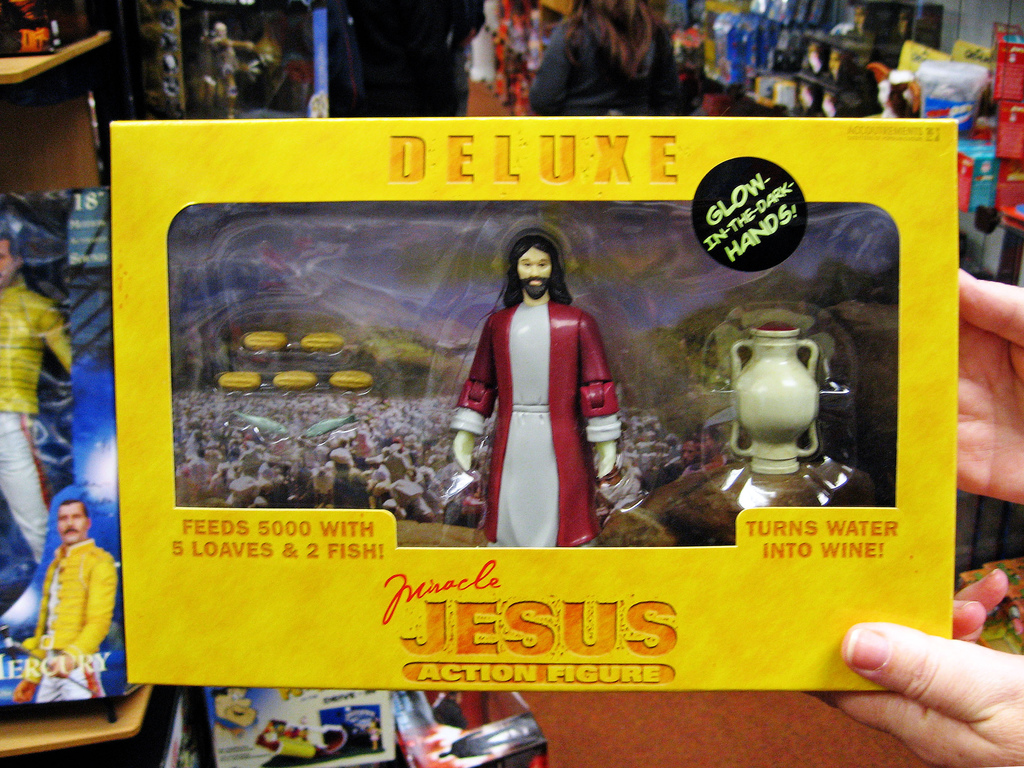If you follow the Lectionary – or if your church does, or if you even know what the lectionary is – you may know that the Gospel lesson this past Sunday was the familiar story of Jesus feeding the 5000. If you don’t know the story, I have a Jesus action figure that illustrates it! Check this out…

My favorite part about this action figure is not just that he comes with 5 loaves and 2 fish or that he has a container to turn water into wine. No, my favorite part is that Jesus has “Glow-in-the-Dark Hands!” Oh yes, because you know that Jesus’ hands glowed just like the tip of Harry Potters wand when he did something magical. A friend suggests that maybe Jesus’ hands became discolored from healing all those lepers…
With that said, be careful. According to the warning on the top of the box, Jesus is a choking hazard and is not suitable for children under 3 years.
But it got me thinking about Jesus and his miracles and how we talk about them today. And with that in mind, I have to wonder about all those who are asking now where God’s power is today and where God’s miracles are today.
When it came to those 5 loaves and 2 fish, did Jesus really do something supernatural so that the food sort of magically appeared as it was being distributed so that it was enough to feed 5000 men (not including women and children) plus 12 baskets left over? Let me be clear. I believe completely that Jesus had that kind of power, that he was capable of the supernatural. I’m not questioning that. What I’m asking is, did he actually use that awesome power in this case?
When I talk to people about that, they say that even asking that question is kinda dangerous, because if he didn’t use that awesome power then it takes away from the power of the story. But I don’t agree.
A friend of mind witnessed a miracle once. He describes it that way. A miracle. He was at a big conference, and they were serving communion (aka eucharist). And they began to run out of bread! As an usher in the back of this hall, he could see that the supply was getting dangerously low. And then he noticed that people were very discreetly walking up behind this table and adding their own bread. It was sandwich bread and other stuff that – it seems – people were going out to their cars and bringing back. And there was enough so that everyone was able to receive communion!
So what if that’s what happened when Jesus fed all those people? Does that mean it wasn’t a miracle? Some would say that’s exactly what it means, and again I don’t agree.
Maybe it’s just a sense of pessimism about people and their nature. I think people are greedy. In the story of Adam and Eve, we learn about their greed for knowledge as they eat the forbidden fruit. And Cain killed Abel because he was greedy for God’s attention. The story of Jacob (who would later be named Israel) illustrates his intense greed, from wanting his brother’s birth-right to his father’s blessing to his father-in-law’s livestock.
The religious leaders of Jesus’ time were greedy for power and control and attention. Many of the people were too! Remember the guy who asked Jesus how to gain eternal life? When he was told to sell all he had and give it to the poor, he went away depressed!
And this hasn’t stopped. Wars among nations are most often started out of some sense of greed. And look at today’s social insistence on instant gratification. Greed is pervasive and it’s a sickness and it eats us from the inside out. Stories of people who give generously and beyond their means are not as common as they could be.
So would it really be any less of a miracle if Jesus motivated 5000 men (not including women and children) to share what meager offerings they had brought for themselves with those who had even less? No, I don’t think it would be less. I think that’s the greater miracle.
And to those who ask where God’s miracles are, I suggest looking beyond the supernatural. God’s presence and power can be seen and observed and experienced. But not always in the flash and bang of magic and mystery. Miracles are way better than that.

